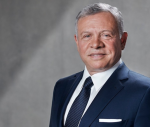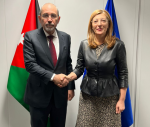You are here
Trump is not the first, and will not be the last, US politician to exploit, then drop the Kurds
Oct 30,2019 - Last updated at Oct 30,2019
In response to US President Donald Trump's personal triumphalism over the slaying by US forces of Daesh’s leader, Kurdish militia Commander Mazloum Abdi tweeted, "For five months there has been joint intel cooperation on the ground and accurate monitoring, until we achieved a joint operation to kill Abu Baker Al Baghdadi. Thanks to everybody who participated in this great mission."
Abdi followed up this message by tweeting on Monday that Baghdadi's senior aide Abu Hassan Al Mouhajir "was targeted in a village named Ein Al Baat near Jarablous city, the mission was conducted via direct coordination of [Kurdish-led Syrian Democratic Forces] & US military [as part of] ongoing ops to hunt [Daesh] leaders". Another Kurdish official subsequently revealed that the Kurds had a spy in Baghdadi's compound in northwestern Syria when US troops arrived in eight helicopters to kill him.
The tweets and the revelation of the spy are tragic for several reasons. First and foremost, they reveal cooperation between the US and Kurdish intelligence agents had been taking place for "five months" before the US killed Baghdadi on October 26. This had continued despite Trump's October 6th betrayal of the Kurds when he decided to pull out US troops from northeastern Syria and permit Ankara to occupy a wide strip of Syrian territory along the Turkish border.
On October 9, Ankara sent troops, surrogate Syrian militiamen and tanks into a 30-kilometre-wide, 120-kilometre-long zone stretching from the border town of Tal Abyad to Ras Al Ain, where Kurdish fighters from the Syrian Democratic Forces (SDF) fought the Turkish invaders. More than 300,000 Kurdish civilians were driven from this zone after being shelled, shot, beaten and sexually assaulted.
Second, the New York Times reported the day after Baghdadi's demise that Trump knew of the CIA special operations plan to kill Daesh's leader months before he announced his intention of withdrawing US troops from northeastern Syria. He fully intended to leave the SDF and Kurdish civilians exposed to a Turkish onslaught.
The New York Times article by Eric Schmitt, Helene Cooper and Julian Barnes also revealed that Trump's "abrupt withdrawal order... disrupted the meticulous planning underway and forced Pentagon officials to speed up the plan for the risky night raid before their ability to control troops, spies and reconnaissance aircraft disappeared with the pullout". Therefore, Baghdadi's death in the raid, officials told the authors of the article, "occurred largely in spite of, and not because of, ...Trump's actions".
His actions, they wrote, "put commanders on the ground under even more pressure to carry out the complicated operation" for which planning had begun in summer when the CIA received information that Baghdadi had settled in a village in Idlib province dominated by Hay'at Tahrir Al Sham, the deadly rival of Daesh. "The Syrian and Iraqi Kurds, one [US] official said, provided more intelligence for the raid than any single country." Trump mentioned the Kurds after thanking Russia, Syria and Turkey for allowing the US hit team to use airspace they controlled.
Third, Kurdish forces, which took part in the March assault on Daesh's last redoubt, the town of Baghouz in southeastern Syria, handed over captive fighters to US and British intelligence agents, who de-briefed them and secured information that led to the raid that killed Baghdadi.
Fourth, the US helicopters and support aircraft, reportedly, took off from an air base near Irbil in the autonomous Iraqi Kurdish region. The Pentagon did not dare to go in from Turkey and the main US base in western Iraq is too far away.
In his press statement on the operation, the inconstant Trump said, "The Kurds have worked along incredibly with us, but, in all fairness, it was much easier dealing with the Kurds after they went through three days of fighting, because that was a brutal three days." This was an outright lie. The Kurds were providing intelligence of Baghdadi's location and movements from the time it was discovered he was in Idlib, more than four months before Trump decided to pull out US troops from the Syrian-Turkish border area.
These words were a pathetic attempt to justify his betrayal by saying that after they suffered attack by Turkey's far larger and better armed forces, the Kurds were more cooperative. They should have halted their collaboration on October 6, pulled their agent out of Baghdadi's compound and urged their Kurdish brothers in Iraq to cease cooperation.
Without the Kurdish component of the Syrian Democratic Forces (SDF) there would have been no ground troops to fight Daesh in Syria. The US-led effort consisted of warplanes to bomb the taqfiris in their capital Raqqa and elsewhere. At least 11,000 Democratic Forces fighters, the majority Kurds, died in the campaign to root out Daesh in Syria. Kurds continue to mount operations against Daesh remnants despite Trump's abandonment to the tender mercies of Turks intent on ethnic cleansing and grabbing land in northeastern Syria.
As far as the Kurds are concerned, Trump has added insult to injury by reconsidering his decision to withdraw all US troops from Syria. Having pulled out 1,000 who had been deployed along the Syrian-Turkish border and prevented the Turkish invasion, Trump has decided to retain several hundred at Tanf in Syria's southeast and to deploy more in Deir Al Zor province east of the Euphrates River to maintain a US grip on Syria's main oil fields. Since Trump is a businessman, he will demand a quid pro quo from someone over his illegal seizure of Syria's oil.
A correspondent recalls that during a trip to Deir Al Zor city in September 2017, she and other members of a group of journalists were told that that the Syrian army was on its way to reclaim the oil fields on the basis of an agreement with the US-backed Kurds. However, the Kurds reneged and reached the fields first, presumably under pressure from the US, then ruled by the Obama administration. Trump is not alone in seeking oil assets. The Kurds could have used the oil to secure advantageous terms for reconciliation with Damascus.
Trump is not the first, and will not be the last, US politician to exploit and then drop the Kurds, who have been betrayed every decade by one Western power or another since World War I.
Nationalist Kurds and Arabs were also bombed by the colonial powers as they settled into Iraq and Syria following the collapse of the Ottoman empire. Iraqi Kurds and Arabs relate tales told by their grandfathers about how they rose up against British imperial rule after the 1919 carve-up of the region and were targeted from the air by Britain with poison gas and phosphorus bombs.













